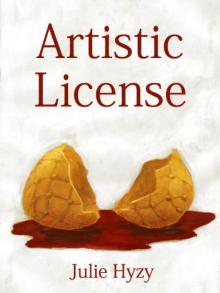- Home
- Julie Hyzy
Grace Sees Red Page 3
Grace Sees Red Read online
Page 3
Even though Debbie appeared as rattled as Cathy was, she raised a hand. “I don’t believe there’s anything to worry about. Really.”
Somehow her assurance didn’t do it for me.
“Take us to her.” Bennett said.
Cathy squeaked. “We can’t.”
“She’s tied up at the moment,” Debbie said.
Reminding me of a spy from some melodramatic 1940s-era film, Cathy ducked her head a bit and looked both ways. She pointed surreptitiously toward the East Wing. “She’s down there. With the police.”
From behind me: “Is there a problem here?”
All four of us jumped. I turned. The cop from the front door was making his way over. With his chin held high, he walked with his arms curled about four inches out from his sides, like he was forming flesh parentheses around his uniformed girth.
“What’s the problem?” he asked again.
“These folks came to see one of the people from the East Wing,” Debbie said.
Cathy had been following the exchange with her giant eyes. “One of the witnesses,” she added helpfully.
Witnesses? I sucked in a breath and took a step closer to Bennett. “What is going on?” I asked quietly.
Cathy shoved the clipboard into Debbie’s hands. “I can escort them over there, if you want,” she said.
“Hang on. What are your names and who are you here to see?” The cop wrote our information down, then held up a finger as he spoke into his radio, conveying a terse summary of the situation to the person on the other end.
The voice crackled back that Ms. Sliwa was currently providing a statement, and further instructed the cop to have us wait in the holding room.
He signed off. “You heard the boss. Your friend is busy for now. These ladies will show you to the holding area.”
“The Sun Gallery,” Cathy said.
The cop looked at her. “What?”
“That’s where we put the people you send over here. It’s called the Sun Gallery.”
“Yeah, okay.” To us: “They’ll show you where to wait.”
“What is going on here?” Bennett asked. “I demand answers.”
Except for blinking slowly a couple of times, the cop didn’t react. “Nothing I can tell you, sir. Now, if you’ll follow these women, they’ll get you settled until your friend is free.”
Bennett was unused to such flat-out refusal. While he wasn’t the sort of person to exercise his considerable influence unnecessarily, he was accustomed to people bending over backward for him. I knew that as much as he relished his position of power in town, he was always happy to step back whenever he sensed that one of his requests pushed too hard. But this wasn’t some ordinary entreaty. Whatever was happening here involved one of our own.
I was close enough to him to feel him quiver with frustration, but the patrol officer was simply doing his job. More important, it was clear that this officer did not possess the authority to disobey orders.
“We’ll take your suggestion and wait in the holding area,” I said to him. “But could you please let Frances know we’re here?” When he nodded and ambled back to the front doors, I turned to Cathy. “Which way is the Sun Gallery?”
“I’ll take you.” She started off at a brisk pace, talking over her shoulder. “We’re using it to house patients the police kicked out when they evacuated the East Wing.” She wrinkled her nose and shook her head somberly. “They don’t seem to be worried about the people on this end of the building, though. I guess because most of the residents here are too out of it to even know something’s going on.”
Sharp tangs of disinfectant rolled over us in waves as we strode past doors dotting both sides of the wide corridor.
“Sundays tend to be quiet,” she said. “A lot of families come by to take their loved ones out for the day. That’s why it’s so empty this morning. After all the excitement though, visitors are allowed only in this wing. After we record their names for the police, of course.”
She stopped long enough to clap a pink hand next to her mouth and stage-whisper, “This end of the building is for the really sick residents. Some of them got moved to this side from the East Wing.” She waggled her brows at us as though that was supposed to mean something.
“Everyone who lives here is wealthy, I take it?” I asked.
She smirked. “You have to be to afford this place.”
Bennett and I exchanged yet another glance. None of this made sense.
Cathy resumed walking and chatting. “At least the Sun Gallery is a nice place to wait. Even the East Wing residents come down here when it’s nice out. The view over the lake is really pretty.” As we took a hard right turn, she extended an arm, pointing farther down the hall. “Percy’s already there. They finished with him about ten minutes ago.”
“Percy?” I asked. “Who’s that?”
She stopped to face us, wrinkling her nose again. “How can you know Frances but not know Percy?”
Bennett appeared as puzzled as I was. Offering an exaggerated shrug, I said, “Frances doesn’t talk about her personal life.”
For the first time since we’d met, Cathy regarded us with suspicion. Folding her arms, she asked, “Then why are you here?”
“Because she asked us to come,” I said. “She gave us this address but didn’t say a word about what was going on.”
Cathy gave a careless little head bobble. “That’s weird, but people are weird.” She started down the hallway again. “Percy’s her husband.”
“Husband?” Bennett and I repeated in unison.
With a fresh swagger in her step, Cathy grinned over her shoulder. “Come on. I’ll introduce you.”
Chapter 4
“Here we are,” Cathy said as we stepped through a double-door entryway.
The Sun Gallery turned out to be a basketball court–sized room with a long wall of screened sliding glass doors, offering a wide view over the lake below.
A dozen people were scattered about the spacious area, most in small groups of two or three. Two elderly residents, heads down, sat knee-to-knee in a far corner, passing playing cards back and forth. Almost everyone glanced up at our arrival, faces suffused with curiosity. A couple of awkward seconds later, all of them returned to whatever they were doing. One hunched-over man with a blanket on his lap lifted his hand in a hesitant hello. I waved back. He squinted at us, dropped his hand, and turned away.
I could imagine how on a summer day, with its windowed doors thrown open and a warm breeze drifting in through its many screens, this room could serve as a cheery porch-like vista to enjoy the sun. But today, with inky storm clouds rolling in over the lake, the darkening room gave off an electric buzz.
Cathy wound her way toward the windowed wall through a sea of wide-set pedestal tables, all of them featuring inlaid checkerboards. “This serves as our game room, too.”
“Very nice,” I said, because she seemed to expect it.
“Isn’t it? Our guests are so fortunate to have such a lovely place to call home. Indwell is state-of-the-art.” She stopped long enough to whisper again. “Poor things. But when people can no longer take care of themselves, this is an ideal alternative.” She delivered this line with a beaming glance at Bennett. A second later, she called, “Percy,” to the man with his back to us, sitting farthest from the door.
He didn’t respond.
As we made our way over, we passed a young man in a highly mechanized wheelchair. He rolled his head against the back of the chair’s extended neck brace to face us. With curly black hair and a chin lined with facial scruff, he looked to be about twenty-five years old.
“Hey,” he called to us in a slurred but friendly manner. His eyes were a deep-set warm brown, and wide with interest. “You here to see Percy?”
Cathy dismissed him with a wave. “I’ll be with you in a minute, Ky
le.”
Kyle nudged a curled hand against the chair’s controls, spinning to face us. “You have to be Frances’s friends, right?” he asked.
Bennett and I stopped. In my peripheral vision, I noticed Percy perk up.
“We are,” Bennett said. “Do you know what’s going on? Can you tell us?”
Kyle blinked and shot us a full-wattage grin. “Sure, I can.”
“Hold up there, kid.” Percy rotated his own motorized chair and whirred across the room to join us, parking himself between me and Bennett. “These folks are here to see me.”
Actually, we’re here for Frances.
With his heavily freckled bald crown and smirking, what’s-it-to-you expression, Percy was a doppelgänger for the actor Gene Hackman. He had a similar nose and lots of laugh-line wrinkles, but didn’t seem particularly jolly right now.
“Hello,” I said, “I’m Grace Wheaton.”
He raised an elbow the way most people might shoo a fly. “I know who you both are. Nice to finally put faces to names.” He turned to Bennett, squinting up at him. “So you’re Marshfield. I thought you’d be taller.”
Cathy giggled. “Isn’t this funny? You know them but they don’t know you. Why on earth did Frances keep you such a secret, Percy?”
“I’ll tell you why.” Percy’s deep, gravelly voice would be ideal for narrating luxury car commercials. “Because of this.” He winged both arms this time, twisting to face me. “She’s embarrassed.”
I didn’t know what to say, though clearly he expected some response. “I’m sure that’s not—”
“You can’t be sure. You don’t know.” Though he cut me off, he didn’t do so unkindly. Nodding toward the front of the building, he said, “Until five minutes ago you didn’t even know I existed.” He turned to face Bennett. “Did you?”
Kyle inched his chair closer. “Frances talked about you two all the time. You think maybe when the police release her, we can discuss me coming out to visit Marshfield Manor? I’d really like to see it for myself one of these days.”
I tried to ignore my churning gut. “Why are the police talking with Frances?” I asked. The coroner out front, the mention of homicide detectives, Cathy referring to Frances as a “witness”—this was not good.
“Now, now, let’s not get ahead of ourselves.” Cathy leaned in closer. She slid a glance toward the hallway. “We’re not supposed to talk about any of this.” Her body language screamed that she was ready to spill.
A crack of lightning zinged across the gloomy sky. Before I could expel a breath, thunder rattled the windows.
“Young woman,” Bennett said. “I ask you to take pity on an old man’s nerves and please tell us what’s going on here and how Frances is involved.”
“Well,” she said, drawing out the word, “this morning—”
“Cathy, what’s taking you so long?” I glanced up to see Debbie calling from the Sun Gallery entryway. “I need help up front.”
“Oops. Gotta run.” Cathy’s grin never dimmed. “I’ll catch up with you later.”
When she was gone, Percy gestured with his eyes. “Have a seat, both of you,” he said. “I’d offer to pull out a chair for you, Grace, but”—he winged his elbows again—“gallantry doesn’t come easy for me these days.”
Although he delivered the words with self-deprecating humor, there was distinct sadness in his eyes.
Using the thumb and index finger of his right hand, Percy manipulated his wheelchair’s joystick, deftly maneuvering the conveyance to a nearby table with his back to the windows. While Bennett and I dragged wooden chairs from the room’s perimeter to join him, Kyle zoomed over to settle across the checkerboard from Percy. Parked sideways, Kyle beamed like a kid who’d just graduated to the adults’ table and couldn’t wait to make a mess.
Thunder continued to crash outside as we settled ourselves. Flashing twigs of light skittered across the murky sky.
Nearly out of patience, Bennett leaned forward, keeping his voice low, his attention lasered on Percy. “Right now I don’t require an explanation as to who you are or why Frances comes to visit you here. All I care to know is where she is and what’s going on.”
“It’s going to be fine. I’m sure it is,” Percy said. “That is, if she can keep her wisecracking to a minimum.”
“I don’t want empty assurances. I want facts.”
“I can tell you,” Kyle said.
“One step at a time, kid.” Percy gave a very Gene Hackman–like wink. To Bennett, he said, “It would help if you didn’t interrupt.”
Bennett’s eyes blazed, but he sat back and drew in a deep breath. “Very well.” He splayed his hands atop the checkerboard tabletop. “You have the floor.”
I guessed Percy to be about ten years younger than my uncle, but whatever health issues he faced aged him. I found him attractive in an older-man sort of way—but then again, I’d always harbored a secret crush on Gene Hackman.
“First of all, although I am able to use my hands and fingers, doing so requires considerable effort. I tend to use my elbows to gesture when I talk.”
Bennett said nothing but his expression spoke volumes.
“I tell you this so you don’t get worried that I’m having a seizure or something.” He shot me a crooked grin. “People do.”
It took all my restraint to calmly urge, “Go on.”
Percy pointed with his chin. “Kyle over there and I live in the East Wing. As does—well, er, did—a guy named Gustave Westburg. We call him Gus. He was old, crabby, and a real pain to have around, wasn’t he, Kyle?”
“I liked him.” The younger man cackled. “Never had a nice thing to say about anybody else, though.”
“He didn’t belong here,” Percy said.
“Who didn’t belong here?” I asked. “Gus?”
“Right. He shouldn’t have been allowed to live with us. He had serious health issues.”
“He probably shouldn’t have been allowed in our wing at all,” Kyle added.
Perhaps reading the confusion on my face, Percy explained, “This isn’t a nursing home. Not in the typical sense.” He rolled his gaze up and around the room. “Each building tends to specialize in some affliction. Except ours. We’re the mishmash, aren’t we, Kyle?”
He grinned. “A real melting pot.”
“Indwell maintains state-of-the-art facilities for all its patients,” Percy said. “One of the buildings you passed on the way is a mental health facility. Another one is for little kids, and another is a rehab center for amputees. People go in and out of that place all the time. No long-term patients there. Not like here.”
“Mishmash,” Kyle repeated. “This wing is for non-ambulatory patients, but our wing is for people like us who can do most things themselves and who don’t need round-the-clock medical attention. I guess it kind of averages out that way.”
“Our wing is designed for people like me and Kyle here,” Percy said. “Our rooms are different from the ones at this end. More like small apartments. Our mobility issues are severe enough that we can’t live on our own but we’re both basically healthy. Gus wasn’t. He shouldn’t have been with us, but when money talks, people listen. It’s different in the East Wing.”
“More space, more autonomy,” Kyle said.
“More expensive, too. Our rooms are specially outfitted.” Percy flailed again as he talked. “I’m telling you, Gus didn’t belong there. He was already going downhill by the time he moved in.”
“But money talks?” I prompted. Bennett caught my eye and nodded approvingly. I knew he’d picked up on that comment, too. “What did you mean by that? I get the impression everyone who comes to live here is wealthy.”
“Not everyone. Not me, for sure. As with anything, there are degrees,” Percy said with a sly grin. “Gus and a buddy made a fortune investing in business together. He�
�s not a gazillionaire like you”—this directed to Bennett—“but he was rich. And then, as the story goes, he got sick. Like me and Kyle, he couldn’t live on his own. But, unlike us, he has kids.”
“He didn’t want to live with one of them?”
“They didn’t like him very much.” Percy barked a laugh. “Nobody did. So the kids decided to bring him here. Thing is, once Gus toured the place and saw how much better the apartments were than the regular rooms, he refused to live anywhere else.”
“If the apartments are as nice as you describe, I’m surprised more people don’t make that choice.”
“They can’t.” Kyle shook his head like a toddler refusing to eat green beans. “Percy and I don’t require constant medical care. Gus did. People that sick can’t live in the apartments because it’s too hard on the nursing staff.”
“But again, unlike us, Gus was ambulatory,” Percy said, pulling the conversation back to his side of the table. “He didn’t need a wheelchair. Not even a cane. He moved slowly and he usually carted an oxygen tank behind him, but he could get around on his own. He should have been assigned to this end of the building but after Gus pressured them, the administration agreed to make an exception and allow him on our side. For a reasonable fee, of course.” Percy dug his elbows into his seat back to readjust himself. “When Frances and I left Indwell this morning, Gus was alive. When we got back, he was dead.”
“Where did you go?” I asked.
“Church. There’s a chapel in one of the other buildings, but we don’t go there. Frances takes me to a parish about ten minutes away and then out to breakfast.”
“Hmph,” Bennett said. “That explains a lot.”
“It does?” I asked.
“You know how Frances is,” he said. “She doesn’t have a lot of friends at Marshfield. Years back, when she first started leaving for the weekend, everyone was atwitter that she wasn’t attending church in Emberstowne anymore. Many unkind remarks were whispered behind her back. I did my best to put a stop to it, but there was only so much I could do.”

 Made for Murder
Made for Murder Grace Among Thieves
Grace Among Thieves Deadly Interest
Deadly Interest Deadly Blessings
Deadly Blessings All the President’s Menus
All the President’s Menus State of the Onion
State of the Onion Grace Sees Red
Grace Sees Red Whitehouse Chef 04 - Grace Under Pressure
Whitehouse Chef 04 - Grace Under Pressure Hail to the Chef
Hail to the Chef Grace Takes Off
Grace Takes Off Grace Against the Clock (A Manor House Mystery)
Grace Against the Clock (A Manor House Mystery) Grace Cries Uncle
Grace Cries Uncle Artistic License
Artistic License Eggsecutive Orders
Eggsecutive Orders Grace Interrupted
Grace Interrupted Affairs of Steak
Affairs of Steak Fonduing Fathers
Fonduing Fathers Foreign Éclairs
Foreign Éclairs Virtual Sabotage
Virtual Sabotage Grace to the Finish
Grace to the Finish